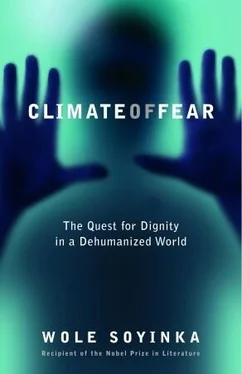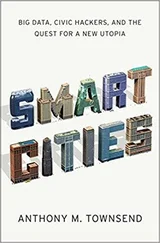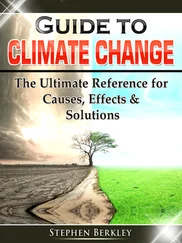It was not theocratic dictatorship but repressions of a secular order that evoked my sense of unease when, a full generation ago, I delivered a lecture entitled “Climates of Art,” to which I made reference at the beginning of this series. There is however a link, unsought, a sense of brutal continuity. That link is the attempted murder of the Egyptian writer Naguib Mahfouz, a Nobel Prize winner, by the way, but what matters to us is that he was — and still is — a writer of his time and, most relevantly, place. Unlike a number of other creative minds trapped within the killing domains of the terminal censors, Mahfouz did survive. So, however, most lamentably, has the poised blade of fanaticism that has become even more proficient and inventive over its agency of execution: the time bomb, the suicide bomb, the sarin sachet, and even, possibly, that ominous pod, miniaturized, one that, almost on its own, bore full responsibility for the climate of fear of fifty years before — the atom bomb. Let Mahfouz serve us as a living symbol of that space of creative martyrdom that stretches from antiquity till now, from the communist world of the Soviet Union to Afghanistan of the Taliban through Iran, Ireland, and Yugoslavia to North Africa — Algeria most excruciatingly.The space of fanaticism aggressively expands into other nations of traditional tolerance and balance, including my own, Nigeria.
Once, the terminal censor flourished in the arena of ideological insecurity and/or the will to total mind domination, where the so-called crime of deviationism — that is, diversion from the strict party line — led, quite simply, to a Siberian wilderness or, straightforwardly, to death. Who can forget the notorious purges and show trials of the Stalinist era! Secular zealotry and intolerance appear to have lost steam since then, although we must be careful not to sing their demise too early. Still, it is largely the religious breed that remains to plague the world, a stubborn strain nestled in the vital organs of humanity from the earliest social orders — as the fate of Socrates eternally reminds us. Now that was one obsessed lover of dialogue, who reminds us that it is from the “dialectics of the mind” that truth is elicited and tested far more durably than from the monologue. The monologue, alas, continues to dominate the murderous swath blazed by succeeding religions — Christianity and Islam most notoriously. Deviationism — or heresy — is one shortcut to death.
My poem “Samarkand and Other Markets I Have Known” was a tribute to Naguib Mahfouz, who was fated to expand into the religious those apprehensions of the secular to which I had given voice in “Climates of Art,” delivered some twenty-five years ago:
… the ink of Kandahar Has turned to blood.The heir of ancient dynasties Of letters — Khuorassan, Alexandria, Timbuktoo lies sprawled In the dirt and dust of a passageway.
He is no alien. No roots than his grow deeper In that marketplace, no eye roved closer home. He is that fixture in the marketplace café Sipping sweetened cups of mint, oblivious of The bitter one that would be served By the shadowy one, the waiter-stalker, a youth Fed on dreams of sarabands of houris Doe-eyed virgins, wine and sweetmeats in the afterlife But to his paradise, a key — the plunging knife.
The nineteenth-century black American scholar W. E. B. Du Bois once declared that the issue of the twentieth century would be that of race. It is becoming clear that while that century, the last, did indeed inherit — and still remains plagued almost continuously by — that social issue, race was replaced toward the end by religion, and it is something that has yet to be addressed with the same global concern as race once was. The issue of the twenty-first century is clearly that of religion, whose cynical manipulations contribute in no small measure to our current climate of fear. Perhaps the Khatami-UNESCO initiative to which I referred in an earlier lecture, a series of contacts titled Dialogue of Civilizations, will succeed in bringing the world to confront this lethal successor to the secular monologue whose fanatic fringe has been lately deprived of oxygen, and much of its breeding ground. In the wilds of Thailand or Cambodia, in a few isolated spots in South America, the mind of the fanatic secularist still operates, locked in a vision of Utopia that demands a disposable approach to “unenlightened” humanity. Pol Pot, however, is dead, gone the way of those other architects of the necropolis, Adolf Hitler, Josef Stalin, and mixed company of both left and right. Today, the main source of the fanatic mind is religion, and its temper — one that, ironically, is grounded in the doctrine of submission — has grown increasingly contemptuous of humanity, being characterized by arrogance, intolerance, and violence, almost as an unconscious vengeful recompense for its apprenticeship within the spiritual principle of submission.
At stake is tolerance, and the place of dissent in social interaction. We would do well, however, to note — for practical ends — the differences between the workings of secular intolerance and those of the theocratic order. Such differences may assist us in assessing the very real threat to human freedom that the closed world of fanaticism poses to humanity. Secular ideology derives its theories from history and the material world. The mind has therefore learned to pause occasionally and reflect on the processes that link the material world to doctrines that derive from or govern it, to review changes in such a world, test theories against old and new realities — be they economic, cultural, industrial, or even environmental. The dynamic totality of the real world is given rational space. Even the craving after comprehensiveness and infallibility — as in the case of Marxism — may result in the exposure of fallacies and inconsistencies or, at the least, ambiguous zones within the theory.
Thus, within a secular dispensation, even under the most rigid totalitarian order, its underpinning ideology— that is, the equivalent of theology — remains open to contestation. Open questioning may be suppressed, open debate may be restricted or prohibited by the state or the party of power, but the functioning of the mind, its capacity for critique — even self-criticism — never ceases. Self-criticism was of course an expression that was much abused under totalitarian orders — Stalinist Soviet Union, China during the Cultural Revolution, or Cambodia under Pol Pot’s Khmer Rouge. Within those self-righteous regimes, self-criticism meant one thing and one thing only: recantation, and a routine incantation of loyal pledges — according to prescribed formulae — to the party line. Despite those perverted rituals, however, the mind remained a free agent within its own space, free to roam outside the confines of the totalitarian order, to seek, and often find, kindred spirits, and form a conspiracy of nonbelievers or, at least, skeptics. This factor leads sooner or later to an alternative view, and perhaps to piecemeal erosion of the hermetic system.
Under the theocratic sibling, however, one that derives its authority not from theories that are elicited from the material conditions of society but from the secret spaces of revelation, this disposition of the mind toward alternative concepts or variants is next to impossible. Curiosity succumbs to fear, often masquerading as pious submission. The theocratic order derives its mandate from the unknown. Only a chosen few are privileged to have penetrated the workings of the mind of the unknown, whose constitution — known as the Scriptures — they and they alone can interpret. The fanatic that is born of this dogmatic structure of the ineffable, religion, is the most dangerous being on earth.
Again, it must be conceded that there are, naturally, numerous variants of the fanatic spore — as well as enabling environments. While psychologists and social scientists theorize over cause and effect, the Community is confronted with an immediate choice: either to submit or to protect itself. Poverty is a powerful recruiting agent for the army of the soul, we know that; so is political injustice — but society fools itself if it imagines that these are the only parameters for anticipating, preventing, or responding to a development where the totality of society is indicted to the undiscriminating extent that all are pronounced guilty who do not share this mind-set of the fanatic, or who dare propose a different worldview from that which motivates it. The philosophy that sustained Nazism was not a philosophy for the amelioration of the condition of the poor; on the contrary, it was a philosophy of elitism, a philosophy of the Chosen versus the Rest. And what we must seek is the common denominator that unites the opposite extremes of beliefs and ideologies but also breeds and nurtures the fanatic, intolerant mind.While we are engaged on that quest, we, the Rest, in whatever aspect of belief we are thus defined, must either lay our necks tamely on this versatile execution block or imaginatively pursue remedial action. This involves, certainly, eradicating those conditions that serve as ready recruitment agencies — poverty, political injustice, and other forms of social alienation — but, even more crucially, demonstrating in an equally determined, structured way our right, indeed our duty, to implement strategies of self-protection, making it abundantly clear that the other doctrine of the Chosen is intolerable to humanity. To do otherwise is to condone the doctrine that moves so arrogantly from I am right, you are wrong to its fatal manifestation as I am right; you are dead.
Читать дальше












